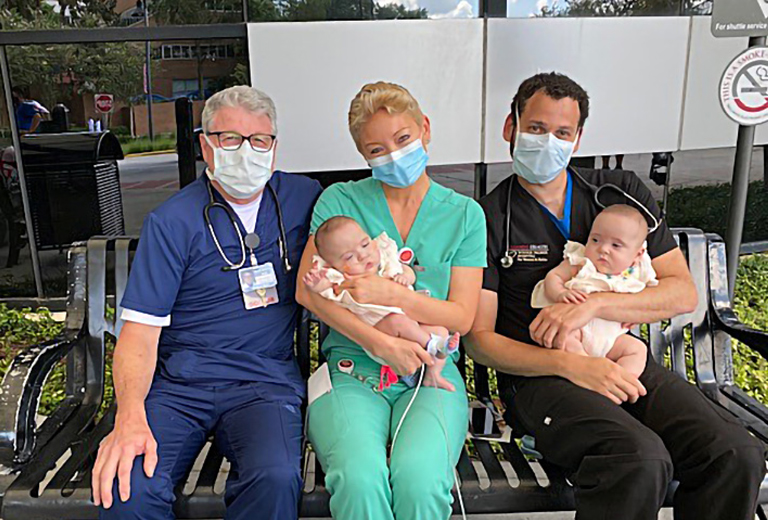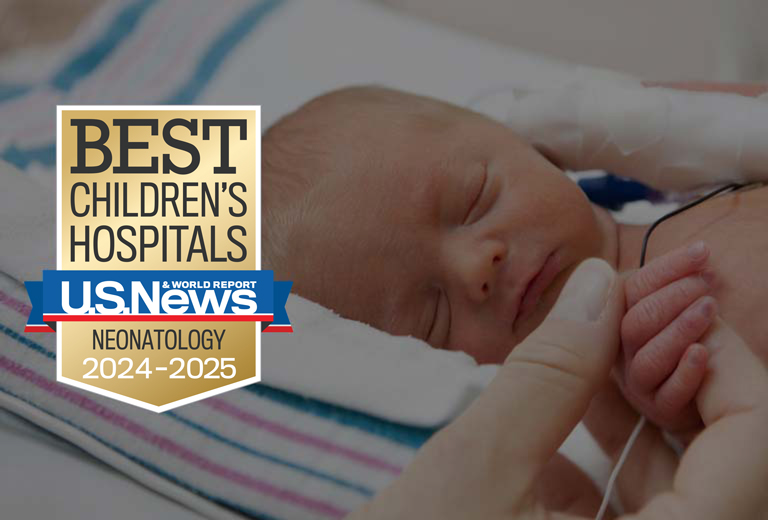Transcatheter Patent Ductus Arteriosus (PDA) Closure

If your baby has a patent ductus arteriosus (PDA), we offer a minimally invasive treatment option called transcatheter PDA.
About the Patent Ductus Arteriosus
Babies are born with a natural connection between the pulmonary artery and the aorta called the ductus arteriosus. For most babies, the ductus arteriosus closes on its own within a few days or even hours after birth. In some babies, particularly those born prematurely, the connection remains open. This congenital heart defect is called a patent ductus arteriosus (PDA).
A PDA can cause the heart and lungs to work harder because oxygen-rich blood mixes with oxygen-poor blood and returns to the baby’s lungs rather than circulating to the rest of the body. This causes the lungs to handle more blood than normal. A PDA can make breathing more difficult for the baby and cause problems with feeding, breathing, circulation and poor weight gain.
Innovative Approach to Care by an Expert Team
The Heart Center at Orlando Health Arnold Palmer Hospital for Children, in partnership with the neonatal intensive care unit (NICU) at Orlando Health Winnie Palmer Hospital for Women & Babies, offers an innovative approach to babies suffering from a PDA called a transcatheter patent ductus arteriosus closure.
When performed by an experienced team like ours, this procedure is 97% effective.
- We are one of 10 facilities in the country — and the only in Florida — to trial this procedure using a new device by Abbot called the Amplatzer Piccolo Occluder, which was FDA-approved in January 2019.
- Because of our advanced expertise, we can close a PDA on premature babies as small as 1.5 pounds (700 grams).
- Orlando Health Winnie Palmer is ranked a “Best Children’s Hospital” in neonatology by U.S. News & World Report; offering the top newborn care in Florida.
How a Transcatheter PDA Closure Works
Transcatheter PDA closure is a minimally invasive, non-surgical procedure used to close your baby’s PDA. Our cardiac team will insert a catheter (long, narrow tube) into a vein in their leg, guiding it to the heart and the PDA. The doctor will then insert a closure device through the catheter and permanently place it in the PDA. It will act as a plug to stop the extra blood flow into the lungs. Over time, tissue grows around this device, and there’s no need for a follow-up procedure to remove it.
Transcatheter PDA closure is less invasive than traditional heart surgery, and in most cases, we can further reduce stress on your baby by keeping them on their neonatal ventilator — as opposed to switching them to an anesthesia machine — for the procedure. As a result, a transcatheter PDA closure poses fewer risks, and offers a faster recovery and better outcomes for your baby.
Comprehensive Multidisciplinary Care
At Orlando Health, we take pride in giving you and your baby seamless access to a complete team offering collaborative pediatric cardiac, pediatric cardiac anesthesia, neonatal support and more:
- Cardiac Care: Pediatric interventional cardiologists and pediatric cardiac anesthesiologists will perform the procedure in our fully equipped Pediatric Cardiac Catheterization Lab located at Orlando Health Arnold Palmer.
- Neonatal Care: Your baby will receive expert care from the neonatologists at the NICU at Orlando Health Winnie Palmer before and after the procedure.
- Neonatal Transport Team: If your baby was born at another facility, our neonatal transport team will transport your baby to Orlando Health Winnie Palmer, where we will admit and care for them in the NICU. After your baby has recovered from the procedure — usually in a few days — the transport team will return your baby to their original NICU for continued care, as needed. Our transport vehicle acts as a mobile NICU, so your baby will travel safely, while receiving constant care.
Referrals
If you have a patient with a confirmed or suspected PDA, please contact us at [email protected] to discuss your patient’s case. We look forward to working with you.








